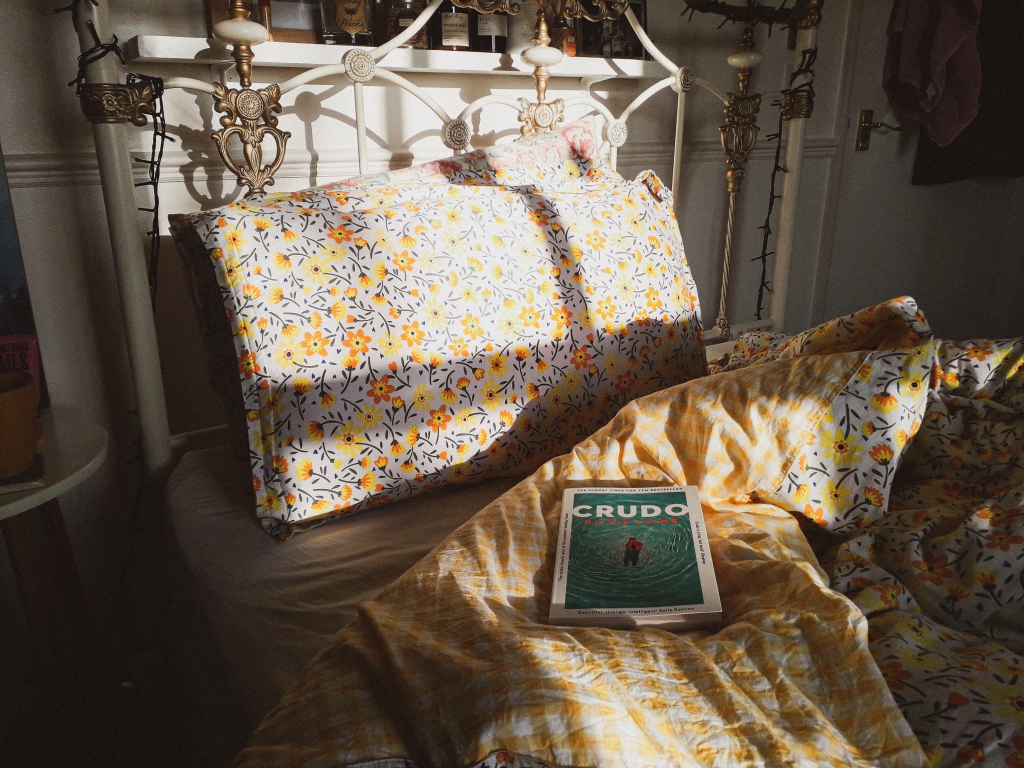Kathy is a writer. Kathy is getting married. It’s the summer of 2017 and the whole world is falling apart.
From a Tuscan hotel for the super-rich to a Brexit-paralysed UK, Kathy spends the first summer of her forties trying to adjust to making a lifelong commitment just as Trump is tweeting the world into nuclear war. But it’s not only Kathy who’s changing. Fascism is on the rise, truth is dead, the planet is hotting up. Is it really worth learning to love when the end of the world is nigh? And how do you make art, let alone a life, when one rogue tweet could end it all?
Olivia Laing radically rewires the novel in a brilliant, funny and emphatically raw account of love in the apocalypse. Crudo charts in real time what it was like to live and love in the horrifying summer of 2017, from the perspective of a commitment-phobic artist who may or may not be Kathy Acker.

After falling utterly in love with The Lonely City, I got pretty obsessed with Olivia Laing. I did the usual thing I do in these instances – sought out as many podcast interviews as I could. Olivia Laing gives good podcast. My favourite of her interviews – as is so often the case – was on Literary Friction (my favourite of the bookish podcasts I listen to), where she talked about her novel Crudo, written in a frenzy over seven weeks in the summer of 2017.
The book is about existing during that summer – the early days of the Trump presidency, the first fallout after the Brexit vote and the ongoing tragedy of the Grenfell Tower fire. It’s about the numbing horror of the 24-hour news cycle, the creeping sense of detached fear we have that maybe we’re in the midst of a long and drawn out apocalypse, where the most we can hope for is to bow out before the bloody end – and this was before most of us knew what a zoonotic disease was, and the role our casual destruction of the planet played in creating them. It’s also a book about learning to be married in your forties, having spent the vast majority of your life alone. On Literary Friction, Laing said it was, in part, a book about selfishness.
A weird thing about Crudo that you don’t strictly need to know going in is that is it is sort of autobiographical – Laing herself was a woman just married in her forties navigating the relentless horror of that summer, and is sort of written as Kathy Acker, a famous post-modernist writer who died in 1997. Laing writes from the perspective of an invented Acker, who in turn built a career out of theft: she wrote her own re-imaginings of Great Expectations and Don Quixote, among others. Like Laing, Kathy loved to write from the invented perspectives of the famous and dead.
Reading Crudo you get whiplash. It is the perfect microcosm of modern life – as they describe it on Literary Friction, the epitome of the state of the nation novel – veering between the different sorts of excess we have at our fingertips. The too much news contrasts with the too much food, horror on screen is read against a backdrop of the glorious Italian summer Kathy spends eating and drinking with her new husband. Crudo means raw in Italian – that’s what it is. This book is about the way the world leaves you raw – and how opening yourself up to someone by marrying them does the same thing.
Crudo is particular to that summer, but applicable to the others that have come since. Trump is no longer president, but Trumpism is still thriving and I’m scared of what will happen next now it is freed from the few remaining threads of accountability the White House provided. Here in the UK, we Brexited, and we’re not focused on it because there is so much else to worry about, but it is chaos and it is destroying businesses, and the consequences in Northern Ireland are as bad as all of the experts nobody listened to predicted. The situations have shifted, but the feeling is the same. The impending doom. There was an odd sort of comfort in sitting in that for Laing for a while, like I recaptured, briefly, that feeling of all being in it together we glimpsed in the early days of the pandemic, when people stood in doorways banging saucepans for the NHS just to feel like they were doing something.
It is not a hopeful book, but it is not strictly a depressing one either. It’s all so beautifully normal – Kathy’s lazy days, the small fights with her new husband that feel huge until they don’t anymore, her constant desire for more space from the man until she has it, and the terrible feeling of missing him when she finally does. It’s a snapshot of a moment that adds up to a devastating and intimate portrait of a person in the midst of a life-shifting summer – but the reality of lift shifting is it doesn’t feel especially huge at the time – in what feels like a world-ending crisis, but actually turns out to be a precursor for whatever comes next. Though Olivia didn’t know that then.
It made me wonder what this crisis is a precursor to.
Sometimes you just have to sit in it for a while, and there’s no one better to do that with than Olivia Laing.









